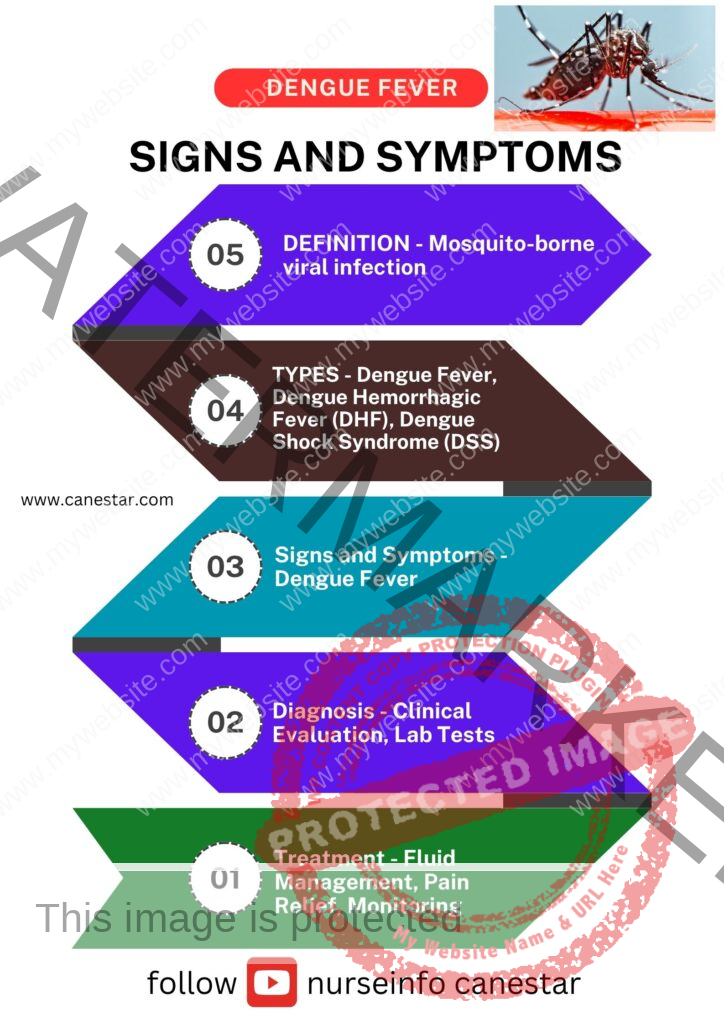Dengue Symptoms – Definition, Types, Signs and Symptoms, Diagnosis, Treatment
DENGUE FEVER
Definition:
Dengue is a mosquito-borne viral infection caused by the dengue virus (DENV), which has four distinct serotypes (DENV-1, DENV-2, DENV-3, and DENV-4). The virus is transmitted primarily by the Aedes aegypti mosquito and, to a lesser extent, by Aedes albopictus.
Types:
- Dengue Fever: Also known as “breakbone fever,” it is the most common and mildest form of dengue.
- Dengue Hemorrhagic Fever (DHF): A more severe form that includes bleeding, blood plasma leakage, and low platelet count.
- Dengue Shock Syndrome (DSS): The most severe form, leading to severe bleeding, organ impairment, and potentially shock due to severe blood plasma leakage.
Signs and Symptoms:
Dengue Fever:
Sudden high fever
Severe headache
Pain behind the eyes
Severe joint and muscle pain
Fatigue
Nausea and vomiting
Skin rash appearing 2-5 days after the onset of fever
Mild bleeding (such as nose or gum bleeding)
Dengue Hemorrhagic Fever (DHF):
Symptoms of dengue fever
Severe abdominal pain
Persistent vomiting
Bleeding from gums or nose
Blood in vomit or stool
Difficulty breathing
Dengue Shock Syndrome (DSS):
Symptoms of DHF
Rapid and weak pulse
Cold, clammy skin
Restlessness or irritability
Diagnosis:
- Clinical Evaluation: Based on symptoms and patient history.
- Laboratory Tests:
Complete Blood Count (CBC): To check for low platelet count (thrombocytopenia) and hemoconcentration.
Serological Tests: Detection of dengue-specific IgM and IgG antibodies.
PCR (Polymerase Chain Reaction): To detect the presence of dengue virus RNA.
NS1 Antigen Test: Early detection of the dengue virus.
Treatment:
There is no specific antiviral treatment for dengue. Management focuses on supportive care and symptom relief:
- Fluid Management: Oral rehydration solutions or intravenous fluids to prevent dehydration.
- Pain Relief: Acetaminophen (paracetamol) to reduce fever and relieve pain. Avoid aspirin and nonsteroidal anti-inflammatory drugs (NSAIDs) as they can increase bleeding risk.
- Monitoring: Close monitoring of vital signs, fluid balance, and platelet count.
- Hospitalization: For severe cases, particularly those with DHF or DSS, to provide intravenous fluids, blood transfusions, and supportive care as needed.
Prevention:
- Mosquito Control: Eliminate standing water where mosquitoes breed, use insect repellent, wear protective clothing, and use mosquito nets.
- Vaccination: Dengvaxia is a vaccine available in some countries for individuals who have had a previous dengue infection.
- Public Health Measures: Community-based mosquito control programs and public awareness campaigns.
Early detection and proper medical care are crucial to reducing the risk of severe complications and mortality associated with dengue.
.


